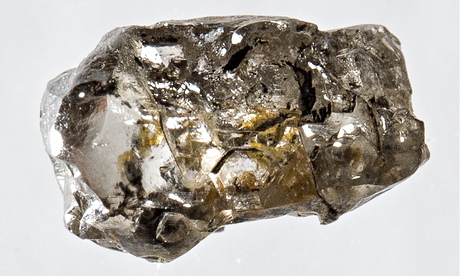Science
Related: About this forumDeep Earth has oceans' worth of water, $10 diamond reveals
A dirty, $10 diamond with a prize inside has helped reveal that there are vast quantities of water stored deep inside the Earth.
The diamond formed in the "transition zone" around 410 to 660 kilometres below our planet's surface. Analysis of a mineral grain trapped inside it suggests that it came from surroundings that were about one per cent water, report researchers led by University of Alberta geochemist Graham Pearson. They published their findings online in the journal Nature today.
If the sample is representative of that part of the deep Earth, the amount of water there could be "about the same as the mass of all the world’s oceans combined," wrote Hans Keppler, a geophysicist at the University of Bayreuth in Germany, in an analysis article.
That, in turn, changes our understanding of the way water cycles through our planet, and has implications for the way tectonic plates and volcanoes behave, Pearson notes.
http://www.cbc.ca/news/technology/deep-earth-has-oceans-worth-of-water-10-diamond-reveals-1.2569564
Warren DeMontague
(80,708 posts)The idea of water lubricating the movements of the plates is not new, AFAIUI.
It also relates to speculation around what went wrong with venus, which does not have plate tectonics to release its inner heat gradually, possibly leading up to episodic bursts of mass vulcanism (the entire surface of venus seems to have been 're-paved' 600 million yrs ago) which in turn probably contributed to the greenhouse atmosphere, further stripping away any water, etc. in a vicious cycle.
Igel
(35,296 posts)It would be dissolved in the rock. Yes, the rock isn't liquid at that depth/pressure, but you can have solid solutions without any problem. (When I say "solid solutions" my high-school kids' eyes cross. I asked their chemistry teachers and they said that yes, they had taught that solutions didn't have to be liquid, but then all the examples they have are liquid and when they do partial pressures a month or two later they don't really emphasize that they're talking solutions again.)
Since the water is an impurity, it lowers the melting point. Just like salt lowers the melting point of ice. It also affects the chemistry of the minerals quite a bit.
Warpy
(111,237 posts)but it's about a mile down. That's where most of this city's water comes from, taking the pressure off inadequate surface water and allowing it to be used by agriculture here and in Texas and native tribes alike.
I'm not a bit surprised about how much water is in deep rock. Stratovolcanoes already told us that.
Maedhros
(10,007 posts)for stratovolcanic eruptions originate. My doctoral work focused on flux melting of the mantle induced by subducted volatiles, and this article made my jaw hit the floor.
(I did my doctoral work at the University of Alberta, but well before Graham Pearson arrived).
rhett o rick
(55,981 posts)Give us a couple of decades and it will be filled with coal ash. Or better yet, what a great place for spent nuclear fuel.
Scuba
(53,475 posts)kristopher
(29,798 posts)Battle-scarred diamond provides evidence of 'wet zone' 410km below the surface where water is locked up inside minerals
Ian Sample, science correspondent
The Guardian, Wednesday 12 March 2014 14.36 EDT

The diamond is pitted from its violent journey, which ended with the stone shooting up through the Earth's crust at around 70km/h. Photograph: University of Alberta
A small, battered diamond found in the gravel strewn along a shallow riverbed in Brazil has provided evidence of a vast "wet zone" deep inside the Earth that could hold as much water as all the world's oceans put together.
The water is not sloshing around inside the planet, but is held fast within minerals in what is known as the Earth's transition zone, which stretches from 410 to 660km (250-400 miles) beneath the surface.
"It's not a Jules Verne-style ocean you can sail a boat on," said Graham Pearson, a geologist who studied the stone at the University of Alberta. The water-rich zone could transform scientists' understanding of how some of the Earth's geological features arose.
Tests on the diamond revealed that it contained a water-rich mineral formed in the zone. Researchers believe that the gemstone, which is oblong and about 5mm long, was blasted to the surface from a depth of about 500km by a volcanic eruption of molten rock called kimberlite.
The battle-scarred gem has a delicate metallic sheen, but ...
http://www.theguardian.com/science/2014/mar/12/rough-diamond-water-earth-wet-zone
Javaman
(62,510 posts)eppur_se_muova
(36,257 posts)***
He said: "I think it's stunning! It implies that the interior may store several times the amount of water in the oceans. It tells us that hydrogen is an essential ingredient in the Earth and not added late from comets.
"This discovery implies that hydrogen may control the interior processes of the Earth just as it controls the surface processes, and that water planets, like Earth, may be common in our galaxy."
A key question posed by the observation is to understand the extent to which plate tectonics on Earth leads to oceans of water being recycled deep within our planet, and to predict the likely amounts of water trapped in other rocky planets.
***
more: http://www.bbc.com/news/science-environment-26553115
If the statement in bold proves out, it may be necessary to revise current theories of planetary formation, especially re the inclusion of volatiles such as water. The conclusions of Ward and Brownlee in Rare Earth may turn out to be too pessimistic.
fascisthunter
(29,381 posts)Very interesting article.
For those interested, I bookmarked this website because I'm fascinated by science:
http://www.sciencedaily.com
Great site for interesting findings in all fields of science.